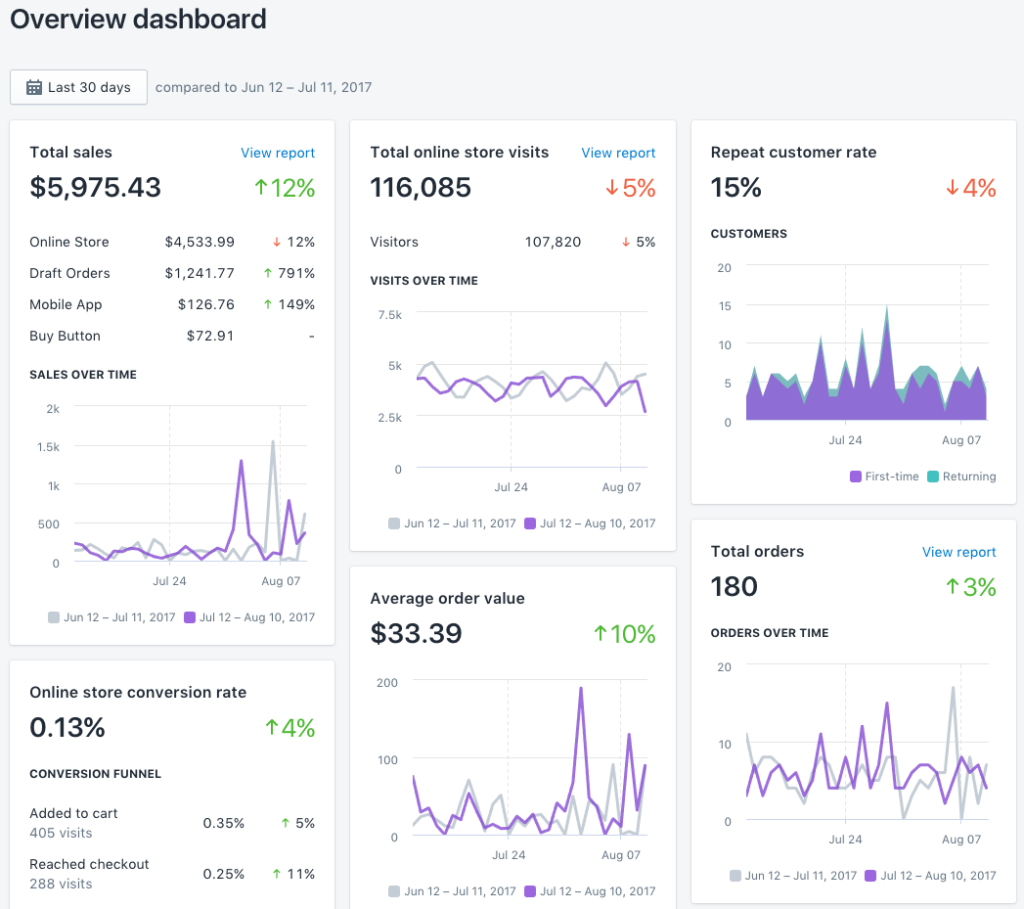E-commerce is increasingly becoming the most common method of revenue generation for enterprises. Operating an online store is a difficult task that entails numerous processes, ranging from product management to payment processing and website development. You will simplify your daily operations by using an eCommerce platform because it contains all of the elements you need to establish and operate your online business. It’s also less expensive than developing software from scratch. Nowadays, e-commerce platforms like Odoo vs Shopify provide many options to help you build your business, regardless of selling online or through your physical store.
We’ll go through what difference between these two e-commerce platforms and which one you should pick for your company in this blog!
Understanding Odoo vs Shopify
Table of Contents
About Odoo
Firstly known as an ERP Solution, Odoo has changed its focus to become a provider of business applications with diverse eCommerce tools such as corporate resource planning, customer relationship management, and point-of-sale systems were founded in 2005. This allows customers to automate and streamline their business processes.
Founded in 2004, Odoo has strived to help around 120,000 customers in over 160 countries become more productive by automating business procedures. As an open-source e-commerce platform, Odoo provides a free or low-cost-to-use business model that sets it distinct from other platforms in the field.
Fabien Pinckaers, the company’s founder and CEO, founded it to “fill a gap in the market” for open-source ERP solutions. “We launched Odoo to make ERP available to everyone,” Odoo is a business application package that includes sales, CRM, project management, warehouse management, manufacturing, financial management, and human resources. Odoo has over a thousand modules, both cloud-based and on-premises. Hence, it is suitable for businesses of all sizes.
Odoo is one of the most popular open-source solutions in the world, with over a thousand downloads/installations every day. With a vibrant community, Odoo can be adaptable to your needs. Furthermore, it is simple to use and can be quickly put into production thanks to its versatility.
Read More: The Reason Why You Should Upgrade To Odoo 15 Version
About Shopify
Shopify is a hosted e-commerce platform that offers a variety of tools to assist you in selling things both online and in person. Are you tired of sluggish hosting during peak hours? Shopify has reliable hosting with a 99.9% uptime guarantee.
Shopify allows store owners to create an online store without any technical and design knowledge. This platform also Shopify makes it simple to start a business by giving you the tools to create your website and sell items and services both online and in person. You have complete control over how you run and market your business once your website has been created.
Moreover, Shopify POS also provides traction for breaking into in-person marketplaces. whether you’re an e-commerce company looking to dominate on the ground or a brick-and-mortar looking to expand into online sales channels, Shopify could become your solid eCommerce platform option
Click to learn more about Shopify development services
Comparison between Odoo vs Shopify

Odoo vs Shopify is both known as “CRM” and “E-commerce” platforms. With Shopify, you are offered the customized layout of your online store and 100+ attractive templates. Whereas, Odoo provides users with key features like website development, and customer relationship development.
With real user reviews focused on functionality, ease of use, customer support, and value for money, we’ll compare and contrast the similarities and differences between Shopify vs Odoo solutions below.
Read More: Odoo CRM: The Solution To Managing Your Customer Effectively
Features and Functionalities

When it comes to features and functionalities, both systems are top-notch. Both of them have robust eCommerce features as well as CRM options.
Shopify features list consists of the following:
- Many handy dropshipping integrations
- Best SEO strategies are supported.
- Store e-mails that are automatically generated
- Inventory management made simple
- Unlimited bandwidth web hosting
- A useful analytics dashboard
- For your mobile device, there’s a Shopify app
Read more about a full list of Shopify features

Odoo has a pleasant user interface and a number of useful features, such as easy configuration, seamless integration, and customization. It’s a centralized strategy on a modular framework.
Odoo comes with thirty main modules that you can combine as needed. Among them are:
- CRM (Customer Management)
- Warehouse Administration
- Point of Sale Project Management (POS)
- Management of Sales
- Manufacturing/Accounting
- Management of Purchases
Read more about a full list of Odoo features
Back end functions

Shopify backend allows you to take a dynamic approach to task management. A small Shopify website could theoretically change themes frequently when necessary. Your store and vital consumer data will be safeguarded if you maintain it behind Shopify’s strong firewall. To boost your customers’ trust, we might declare that your Shopify Store has top-notch security.
Shopify also allows you to integrate with thirty-party partners’ themes and plugins. In addition, Shopify offers multiuser logins and modern programming. Shopify users can also take advantage of mobile Shopify apps, mobile browser support, data backup solutions, and cloud-based editing.
On the other hand, Odoo is an excellent solution for small and medium enterprises since it offers both an easy-to-manage store and a robust back-end system. Accounting, invoices, inventory, CRM, procurement, and other tasks may all be handled from a single terminal with this program.
Setup and Customization

While other e-commerce platforms take a long time to learn and require extensive training businesses can save a lot of time launching a Shopify store, as it only takes a couple of minutes. This includes setting your general design, payment processing, and any apps that your online store might require.
Though you’ll need to get acclimated to the Shopify interface and perhaps read a few Shopify tutorials, the Shopify dashboard is about as user-friendly as it gets. Shopify Plus allows you to customize everything that matters to today’s online shoppers, including themes, items, discounts, checkouts, and payments.
Odoo is also simple to use and set up. You may create an e-store without extensive technological knowledge. This platform has a variety of Odoo themes to help you improve your online store. You won’t need to hire a professional to set up your e-commerce website either.
Furthermore, the free community version of the Odoo platform has been rooted for easy installation and free downloading. Newcomers and specialists both like Odoo’s ease of use, as well as the extensive customization capabilities.
SEO Features

Search engine optimization is critical for every online business’s success. Both Odoo and Shopify include all of the features you could expect from a full-featured cloud-based platform.
Shopify SEO refers to a set of SEO tweaks specific to the Shopify platform. With Shopify SEO, you can set up a store that is both technically sound and targeted to what potential buyers expect. Shopify comes with a number of SEO capabilities out of the box. It covers everything from creating your store to optimizing each page, attaining fast loading times, expanding internationally, and bringing in more organic visitors.
On the other hand, Odoo abstracts all the technical complexity of SEO and handles everything for you, in the best possible way, to ensure that Odoo Website and Odoo eCommerce users have fantastic SEO. Odoo can automatically generate the title and meta description based on the page title and content. Besides, Odoo has a keyword finder to help you create high-quality content and increase organic traffic. Odoo also offers many modules that can assist you in producing content for your website and many features for mass sharing content on social media.
Customer Management Features
Every e-commerce platform requires a customer management system (CMS). Both platforms have their own noticeable customer management features.
Shopify will immediately add customer personal data to your customer list after they purchase something from your Shopify store. If a customer interacts with your business, such as by signing up for your mailing list or creating a customer account, Shopify will automatically form a customer profile. You can send email messages to individual customers from your Shopify admin, or you can use customer segments to send discounts and emails to them.
On the other hand, one of the elements on which Odoo concentrates on specific CRM modules of operation is Customer Relationship Management. The Odoo CRM module will provide an interface for all aspects of customer management, from obtaining leads and converting them into potential customers. Furthermore, customer administration can be completed by following up and ensuring their return at the next purchase.
Hosting and Security Aspects

Your e-store goes live on the internet thanks to hosting. On the other hand, security ensures that it is entirely secure and hack-proof. Odoo stands steadfast in this regard. Shared SSL, SQL injection tracking, suspicious activity monitoring, regular backup, data encryption, and more features are available. Both platforms provide dedicated SSL, cache options, and data encryption, among other features.
Compared to Odoo, Shopify encounters some security loopholes. However, in recent years, Shopify has implemented a variety of security safeguards to protect client data. Shopify’s fraud prevention system is good, flagging possibly fraudulent orders for manual scrutiny before processing. Besides, Shopify’s backend is safe and secure, using a user permission scheme.
Administrative Features
These administrative features make your e-store run smoothly and efficiently. When compared to Odoo, Shopify offers fewer admin features. Bulk order processing and bulk product import/export modules are not available in Shopify. Meanwhile, Odoo has API support as well as user permissions and roles.
Promotion and Marketing Features
It’s critical to grow traffic and convert visitors into consumers after you’ve launched your store. Developing a marketing plan will help you choose marketing methods that are suited for your store, whether you sell online or in person.
In this aspect, both platforms offer a comprehensive set of modules for website promotion and marketing. As a SaaS platform, Shopify lacks several key promotion features compared to Odoo, such as product comparison, and product creation, which could be made up for using Shopify apps Still, there are numerous marketing tools available to assist you in promoting your Shopify store.
From the Marketing page in Shopify, you can get marketing recommendations and build marketing activities and automation. As mentioned previously, you can improve your SEO for a higher ranking in search engines or social media. Customers can also utilize discount codes in your online store or in a physical location. You can also run promotions in your store, such as seasonal sales and flash sales, to boost traffic and revenue.
Similarly, you may establish automated and targeted marketing campaigns with Odoo. Odoo assists you in segmenting your prospect database so that you can send the correct message to the right prospect. Furthermore, Odoo may create advanced marketing processes that are centered on your prospects and nurture them effectively through your sales funnel, 24 hours a day, seven days a week.
Inventory Management Features

The quantity of a product that is available for sale is referred to as inventory. Inventory tracking can assist you to avoid selling out-of-stock items and alert you when you need to order or manufacture more of your product.
In Shopify’s Inventory section, you are able to set up inventory tracking, see your inventory, and alter your inventory levels. For products and variants whose inventory is tracked by Shopify, you can also see the history of inventory modifications. In Shopify’s Inventory Reports section, you can examine changes in inventory levels.
On the other hand, Odoo Inventory Management takes care of all aspects of a company’s warehouse by employing unique, well-designed operational instruments to meet comprehensive and realistic operational requirements. Furthermore, when utilizing the Odoo platform, you will be able to manage many warehouse management operations for a corporation. This will be advantageous for worldwide organizations and establishments with multiple warehouses.
Payment and Pricing Features
With Shopify, you can offer customers a variety of payment integrations. You can use Shopify Payments or a third-party service to allow your customers to pay with a credit card. Customers can also use various payment methods such as PayPal, Facebook Pay, Amazon Pay, and Apple Pay to make payments online without using a credit card.
The Odoo platform, unlike Shopify, offers Worldline SIPS integration. Both e-commerce software offers traditional payment systems such as PayPal and supports multiple payment gateways, though Odoo currently doesn’t support recurring payments and multi-currency/multi-providers.
Reporting and Analysis
An e-commerce store’s ability to provide accurate reports for future use in business growth is critical. Odoo helps you create detailed sales reports that include inventory, sales, and product performance data. Inventory reports, invoicing, A/B testing reports, sales summary reports, and a variety of other reports are available, depending on your business needs.

- Odoo Reporting
Meanwhile, Shopify reports are categorized according to the sort of information they display. Depending on your Shopify subscription plan, you can view various sorts of reports. Traffic analytics is also available on both platforms. Especially, Shopify offers a number of analytics tools to assist users in making informed business decisions in order to enhance sales and improve website efficiency.

- Shopify Analytics’s dashboard
Cost
One of the main differences between these two platforms is their price point: Odoo starts at $10/month while Shopify begins at $29/month, plus a 14% fee on all transactions processed through its system.
Shopify’s most basic features start at $29 per month and go up to $299 per month for Advanced Shopify. The basic fee isn’t prohibitively expensive, and they provide a free trial for individuals who prefer to try before they buy. It also comes with free updates.
Odoo Community is an open-source project that will always be available for free. The cost of Odoo Enterprise is determined by the modules selected by enterprises. The pricing of modules starts at roughly $12 per month, and you can pay monthly or yearly. A separate user fee is charged, which is proportional to the number of users. Odoo offers setup assistance for a fee of $3,000, although it is entirely optional.
You can get more detailed information about Shopify and Odoo pricing with just a single click!
Odoo vs Shopify – Which one suits you best?
It’s critical to pick the most suitable platform between Odoo vs Shopify for your online store. It lays the groundwork for a successful eCommerce business by laying the framework for your store.
Inventory management, product management, customer management, and accounting are what make Odoo stands out. It also provides managers with reporting and analytics capabilities to help them make better decisions. Shopify has the same capabilities as Odoo and provides online store design templates and tools to help users manage their stores more easily.
We have highlighted the ways in which Odoo vs Shopify differ above. Below, we will help you to choose the best eCommerce platform out of these two technology solutions for your business needs.
What types of companies should use Shopify?
Shopify serves businesses of various sizes, from small startups to large corporations. They do over 600,000 businesses worldwide, all of which use Shopify’s powerful eCommerce platform. Shopify appeals to entrepreneurs since it does not require long-term commitments or high setup fees. You can even customize and grow your business by adding powerful features from their App Store.
Read More: The Differences Between Odoo Community Vs Enterprise
What types of companies should use Odoo?
Odoo has an immensely varied customer base, including eCommerce sites, with over five million users. Furthermore, because it is so adaptable, Odoo can be used by enterprises.
While many large firms use Odoo, it’s also a great option for startups because it has a free version. Therefore, admins can operate the website easily with a little more effort. It will also grow with your company because you can add modules as needed.
Let’s build your dream online store
As we’ve seen, there are a number of different things to consider when deciding on the ideal eCommerce platform for your company. What works best will depend on your objectives, budget, and expertise. When deciding between Odoo vs Shopify, think about what’s most important to you.
Overall, Shopify is a good choice if you want to create a simple website that requires minimal time and effort to maintain. It is an excellent solution for startup businesses that lack the financial resources or technical expertise to invest in a more comprehensive structure.
Meanwhile, Odoo is a superior choice if you’re searching for a low-cost ERP platform with the ability to scale up later. I believe it is undeniably a win-win situation for firms of all sizes, across all industries and sectors.

If you want to build your own online business based on Odoo or Shopify, BSS Commerce is confident to deliver you the best Odoo and Shopify software development services. With over 9 years of eCommerce experience, thousands of customers, hundreds of 5-star reviews, and numerous digital projects under our belts, we’re confident in our ability to be your trailblazer and partner in creating an intuitive, sales-driven, and strong technological project. If you have any inquiries, feel free to contact our dedicated experts for relevant answers.
